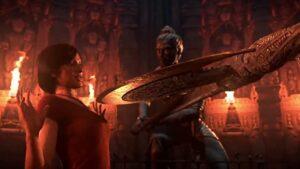For this Critical Play, I will be discussing Uncharted: The Lost Legacy. I had a great time playing the game on the Playstation, and as a long time fan of the Uncharted series, I felt the game was a welcome addition to the franchise. This game was developed by Naughty Dog studios and published for the Playstation 4 in 2017, and later remastered and released for the Playstation 5.
Uncharted: The Lost Legacy, which I will refer to as Lost Legacy for the duration for this writing piece, is a clear example of a piece of media challenging gender stereotypes and roles, with strong female lead characters competently and independently working towards achieving their goals. In fact, it definitely seems that to great degree Lost Legacy was heavily inspired by the Tomb Raider series and Lara Croft, given the parallels with strong female lead characters and the majority of the game taking place within an archeological adventure setting.

The game’s locomotion system and combat mechanics work together to provide the player with a engaging and fluid gameplay dynamic which allows the player to feel immersed in the action. The combat, gunplay, and vaulting mechanics, along with the mini logic puzzles scattered throughout the game enabled the narrative to seamlessly blend into the gameplay, while cinematic cutscenes and quicktime events emphasize and accentuate key narrative beats.
The game is a linear, single-player third person shooter action game and primarily works within the sensation (arising from the sharp visual design and visceral gameplay immersion) and narrative types of fun.

To me, playing a game like a feminist means being mindful and aware of the roles and stereotypes that women are pushed into in video games. As such, taking note of the costumes women in games wear, the actions they take, their mannerisms, their body language, and their plot significance are all aspects that need to be taken into account. In Lost Legacy, for example, the primary lead protagonists both exhibit a great deal of agency, which is an integral component of feminist theory. The primary critiques that I have with game are mainly with the game’s abridged length, which leads to the protagonists having less character development when compared with other Uncharted titles. Additionally, as Lost Legacy has two leads, they end up having less individual character exploration as a whole throughout the course of the game’s narrative. If I were to tweak the game, I would perhaps only have one main protagonist character for the game, and focus more of the writing towards fleshing them out further.
What is an example of a game with an ensemble lead cast that handles notions of femininity well?



